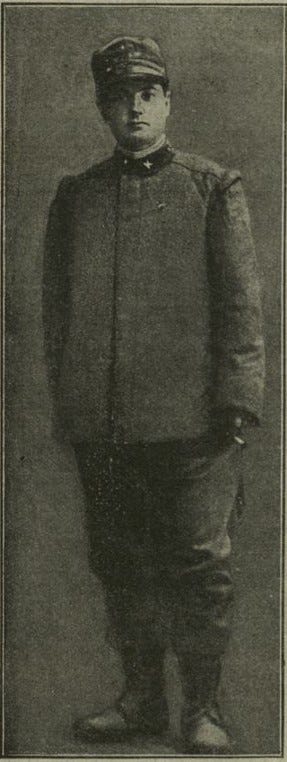The outbreak of World War I was greeted with enthusiasm by many, unaware of what it would entail. The war, it was believed, would be short, and young people especially saw it as an opportunity to prove their worth and patriotism.
Propaganda painted the enemy as a barbarian to be defeated and the war as a necessary, morally justified act. Newspapers fueled this collective fever, reporting stories of individual heroism to inspire their readers.
Here is an example from an Italian newspaper, La Stampa, dated May 31, 1915 (Italy had entered the war on May 24, 1915, alongside France, England, and Russia).
It tells the story of a primary school teacher (a woman!) who, driven by love for her country, disguised herself as a man to go to war and fight the enemy.
Miss Soldier
This handsome infantryman is Miss Luigia Ciappi, the Tuscan teacher who attempted to go to war. As previously mentioned, she is a teacher in Moncioni, a district of the municipality of Montevarchi, but her parents live in Florence, on Pindemonte Street, together with her married brother.
She was so filled with enthusiasm for our war against Austria that, writing to her sister-in-law a few days ago, she expressed her desire to fight against the Austrians. She also confided that she was putting her plan into action, intending to reach the front dressed as a soldier.
After obtaining leave, she went to Florence and was able to easily procure a military uniform by having it made by a Florentine tailor, to whom she claimed it was for a brother who had been called to serve. Dressed in the uniform, she entered the San Giorgio barracks just as the regiment was preparing to depart. Equipped like the others, she left with them.
But at the Bologna station, she was recognized and taken back to Florence. Then, Miss Ciappi returned to Montevarchi, where the local population and her colleagues gave her a warm demonstration of sympathy.
Beyond these remarkable stories, women played a crucial role during World War I in Italy and other countries, marking a pivotal moment in social history.
They became active members of the economy and broader society for the first time. They took on roles in new sectors, such as metallurgy (which had been converted to meet wartime needs), mechanics, transportation, and administrative duties.
This shift supported the war effort and laid the foundation for significant social changes in the post-war era.
The translation from the Italian is my own.




I didn't know that! I'm glad she came back to her school, though.
Me too! I think she was very young, and like many at the time, she was a victim of propaganda and had no idea what going to war really meant.